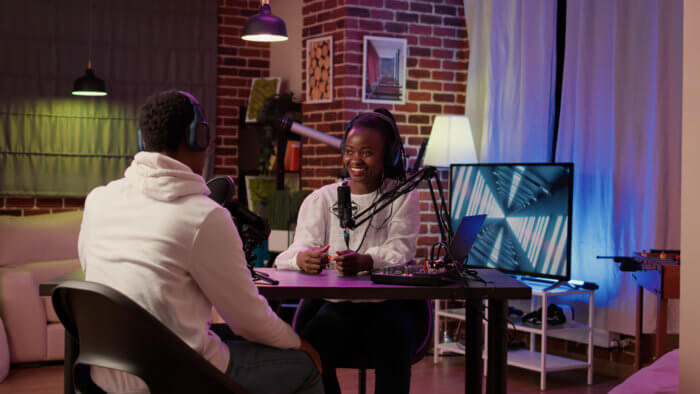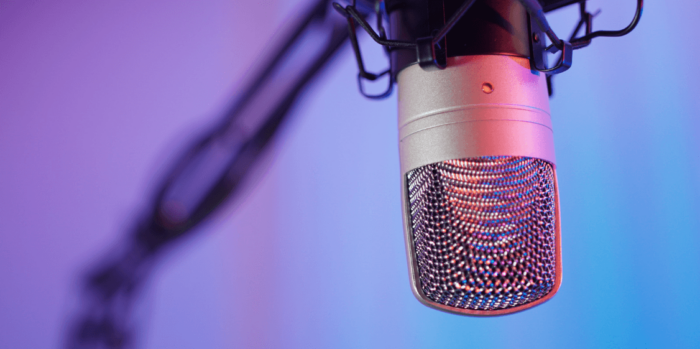3 Podcast Guesting Tips For Higher Education Professionals
Podcast guesting provides numerous benefits to higher educators. You fulfill your obligation to publicly present your work while simultaneously promoting your institution, increasing social followers, and networking with other professionals in your field.
But if you’ve never guested on a podcast before, the task can be daunting. A great podcast appearance always feels easy to the listener, but this is just an illusion. In reality, there is great skill and preparation required to be a great podcast guest.
In this article, we’ll discuss 3 major best practices you should keep in mind when guesting on podcasts.
Table of Contents:
1) Do Your Research

As a higher educator, you’re used to researching your area of expertise. But when podcasting guesting, you also need to research the show you’re guesting on. Here are a few areas to look into before recording:
- Learn the Topics: The listeners of a show are often interested in a specific niche, so if you can use your expertise to provide a unique angle on the podcast’s topics – you’re sure to be a big hit with the host and their audience.
- Pronounce the Host’s Name Correctly: This is so simple that it’s easy to overlook. The last thing you want is to realize during the interview that you’re not sure how to pronounce the host’s name – so remember to learn the proper pronunciation before your guest appearance.
- Understand the Podcast’s Structure: If you listen to a few episodes of the show before your appearance, you’ll learn the show’s structures and segments. This allows the episode to flow smoothly for the host and the listeners.
- Learn Episode Length: When you are listening to episodes during your research, pay attention to the episode length. This will help you tailor your message to the length of the podcast. The worst case scenario is to get cut off before you’re able to share everything you wanted to say.
- Be Aware of Tone: You are a guest on the podcast, it’s their show, and you are helping them. Learn the tone of the podcast, so you can match it during your guest appearance. If the show is a comedy, and you are super serious, the resulting episode could be disastrous. Luckily it’s easy to understand a podcast’s tone just by listening to a few episodes.
2) It’s a Conversation, Not a Lecture

As an educator, your default mode of communication may be to lecture. But it’s crucial to remember that as a podcast guest, you aren’t a teacher, you are a collaborator.
There are a few best practices to help the conversation flow naturally, while still being able to share your vast knowledge.
- First is to be attentive. You need to remove any distractions from your environment so you can focus on what the host is saying. Don’t answer immediately. Instead, you first need to concentrate on what they want you to hear, and any takeaways they are trying to convey.
- Show you’re listening. It is easy for the speaker to tell if you are paying attention. Make eye contact, nod, and say “yes.” Avoid interrupting—it may derail the conversation.
- Provide feedback. Whenever the opportunity presents itself, provide insightful feedback. You could do this by sharing your opinions and asking follow-up questions.
- Don’t draw conclusions too quickly! No one is a mind reader. If you need clarification about something, ask for more information.
- Give them the chance to rephrase or clarify. For instance, say, “I want to clarify what you meant by X.” In this way, you avoid making a mistake by giving them a chance to clarify or rephrase.
3) Perfect Your Recording Set-Up

Being a higher educator gives you a lot of credibility with the podcast’s audience. You are viewed as a professional and as an expert in your field. But that credibility can be easily damaged if your recording set-up is not up to snuff. A bad microphone or video quality suddenly makes you seem unprofessional.
Luckily this problem is easy to solve with minimal money and effort. Here’s an overview of the easy wins for your podcast recording set-up
- Microphone: Your microphone is the bedrock of your recording set-up. But good microphones are cheaper than you’d expect! Check out our full guide to the best podcast microphones.
- Headphones: Headphones prevent echo and allow you to listen closely while recording. You may already have sufficient headphones for podcast guesting, but if you’re looking for an upgrade, read our full article about the best podcast headphones.
- Recording Space: When preparing your recording space, you are mainly thinking about two things: ambient sound and echo. To prevent ambient sounds from bleeding into your recording (like cars driving by or your air conditioner), record in a space with few windows and other random noisemakers. And to prevent your voice from echoing around the room back into your microphone, record in a room with lots of soft surfaces like blankets and pillows. These will absorb the sound, ensuring crisp audio quality.
- Recording Software: You’ve worked hard for your high audio quality, but all of that work is for naught if you don’t record it properly. Ask the host for their preference on how you record your end of the conversation.
- Video Camera: Not all podcasts are video podcasts, but it is a growing trend, so it’s something to keep in mind. For a one-time guest appearance, your phone is probably high enough video quality, but if you’d like to upgrade, check out our Ultimate Guide to Video Podcast Equipment.
Unlock more with Podchaser Pro
- Audience Insights
- Contact Information
- Demographics
- Charts
- Sponsor History
- and More!

- Account
- Register
- Log In
- Find Friends
- Resources
- Help Center
- Blog
- API
Podchaser is the ultimate destination for podcast data, search, and discovery. Learn More
- © 2024 Podchaser, Inc.
- Privacy Policy
- Terms of Service
- Contact Us